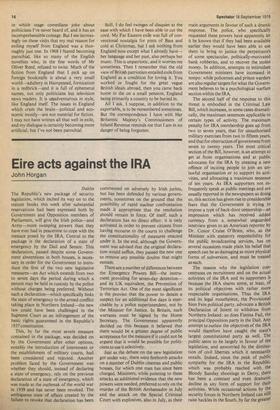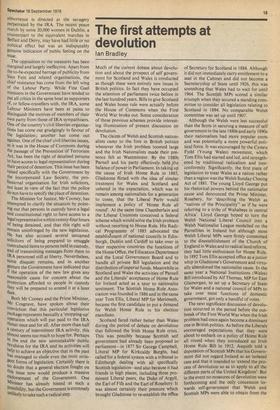Eire acts against the IRA
John Horgan
Dublin The Republic's new package of security legislation, which inched its way on to the statute books this week after substantial reservations had been expressed both by Government and Opposition members of Parliament, will give the Irish police—and Army—more sweeping powers than they have ever had in peacetime to cope with the menace posed by the IRA. Central to the package is the declaration of a state of emergency by the Dail and Senate. This declaration, passed despite some Government abstentions in both houses, is necessary in order for the Government to introduce the first of the two new legislative measures—an Act which extends from two to seven days the period during which a person may be held in custody by the police without charges being preferred. Without such a declaration—which specifically links the state of emergency to the armed conflict taking place in Northern Ireland—the new law could have been challenged in the Supreme Court as an infringement of the basic rights guaranteed in the Republic's 1937 constitution.
This, by far the most severe measure contained in the package, was decided on by the Government after other options, notably the introduction of internment or the establishment of military courts, had been considered and rejected. Another problem faced by the Government was whether they should, instead of declaring a state of emergency, rely on the previous declaration of a state of emergency, which was made at the outbreak of the world war in 1939 and has never been revoked. The ambiguous state of affairs created by the failure to revoke that declaration has been commented on adversely by Irish jurists, but has been defended by various governments, sometimes on the ground that the possibility of rapid nuclear confrontation made it appropriate that the resolution should remain in force. Of itself, such a declaration has no direct effect : it is only activated in order to prevent citizens from having recourse to the courts to challenge the constitutionality of measures enacted under it. In the end, although the Government was advised that the original declaration would suffice, they passed the new one to remove any possible doubts that might remain.
There are a number of differences between the Emergency Powers Bill—the instrument providing for seven-day detention— and its UK equivalent, the Prevention of Terrorism Act. One of the most significant is the proviso that the power to detain a suspect for an additional five days is exercisable by a police superintendent, not by the Minister for Justice. In Britain, such warrants must be signed by the Home Secretary. The Government apparently decided on this because it believed that there would be a greater degree of public acceptance for the measure if it could not be argued that it would be possible for politicians to use it selectively.
Just as the debate on the new legislation got under way, there were firebomb attacks on a number of Dublin cinemas and public houses, for which one man has since been charged. Ministers, while pointing to these attacks as additional evidence that the new powers were needed, preferred to rely on the murder of the British Ambassador in July and the attack on the Special Criminal Court with explosives, also in July, as their
main arguments in favour of such a drastic response. The police, who specifically requested these powers have apparently let it be known that if they had been available earlier they would have been able to use them to bring to justice the perpetrators of some spectacular, politically-motivated bank robberies, and to recover the stolen money. In addition, attempts to intimidate Government ministers have increased in tempo: while policemen and prison warders are also regular targets for what the Government believes to be a psychological warfare section within the IRA.
The second half of the response to this threat is embodied in the Criminal Law Bill, which increases, in some cases dramatically, the maximum sentences applicable to certain types of activity. The maximum penalty for IRA membership goes up from two to seven years, that for unauthorised military exercises from two to fifteen years, and that for obstruction of government from seven to twenty years. The most critical section of the Bill, however, is an attempt to get at front organisations and at public advocates for the IRA by creating a new offence of inciting people to join an unlawful organisation or to support its activities, and allocating a maximum sentence of ten years. As IRA supporters not infrequently speak at public meetings and are usually reported in the newspapers as doing so, this section has given rise to considerable fears that the Government is trying to impose a type of back-door censorship—an impression which has received added currency from a somewhat unguarded interview given to an American reporter by Dr. Conor Cruise O'Brien, who, as the Minister with statutory responsibility for the public broadcasting services, has on several occasions made plain his belief that speech can be as damaging as more physical forms of subversion, and must be treated as such.
The reason why the legislation concentrates on recruitment and on the actual activities of the IRA and its supporters is because the IRA shares some, at least, of its political objectives with rather more respectable organisations. Thus the IRA and its legal mouthpiece, the Provisional Sinn Fein political party, advocate a British Declaration of Intent to withdraw from Northern Ireland : so does Fianna Fail, the principal Opposition party in the Dail. Any attempt to outlaw the objectives of the IRA would therefore have caught the state's largest constitutional party as well. The public seem to be largely in favour of the legislation, and unworried by the diminution of civil liberties which it necessarily entails. Indeed, since the peak of public sympathy for the IRA in the Republic, which was probably reached with the Bloody Sunday shootings in Derry, there has been a constant and even dramatic decline in any form of support for their activities. While occasional actions by the security forces in Northern Ireland can still raise hackles in the South, by far the greater
abhorrence is directed at the savagery Perpetrated by the IRA. The recent peace march by some 20,000 women in Dublin, a counterpart to the equivalent marches in Belfast and Derry, may have had little or no Political effect but was an indisputably genuine indication of public feeling on the issue.
The opposition to the measures has been marginal and largely ineffective. Apart from the to-be-expected barrage of publicity from Sinn Fein and related organisations, the Chief resistance has come from the left wing of the Labour Party. While Fine Gael ministers in the Government have tended to Put all critics in the same boat as supporters of, or fellow-travellers with, the IRA, some Labour Ministers have been at pains to distinguish the motives of members of their own party from those of IRA sympathisers. One of the country's civil liberties organisations has come out grudgingly in favour of the legislation; another has come out against. One of the chief civil liberties issues, as it was in the House of Commons during the passage of the Prevention of Terrorism Act, has been the right of detained persons to have access to legal representation during their period of detention. This issue has been raised specifically with the Government by the Incorporated Law Society, the professional organisation for Irish solicitors, not least in view of the fact that the police do not have to specify the place of detention.
The Minister for Justice, Mr Cooney, has attempted to clarify the situation by pointing out that persons in custody have a legal and constitutional right to have access to a legal representative within twenty-four hours of being detained, and that this right will remain uninfringed by the new legislation. He has also accused several unnamed solicitors of being prepared to smuggle contraband items to persons held in custody, and of transmitting messages from them to IRA personnel still at liberty. Nevertheless, some disquiet remains, and in another gesture the Government have indicated that if the operation of the new law gives any reasonable cause for concern about the Protection afforded to people in custody they will be prepared to amend it at a later date.
Both Mr Cooney and the Prime Minister, Mr Cosgrave, have spoken about their conviction that this particular legislative Package represents basically a 'mopping-up' operation which will put paid to the IRA threat once and for all. After more than half a century of intermittent IRA activity, this a. 'most seems too much to hope for. Perhaps Iii the end the new unmistakable public revulsion for the IRA and its activities will help to achieve an objective that in the past has managed to elude even the most stringent forms of legislation. Certainly there is no doubt that a general election fought on this issue now would produce a massive endorsement of the Government. One Minister has already hinted at such a Possibility, but the Government is extremely Unlikely to take such a radical step.






































 Previous page
Previous page